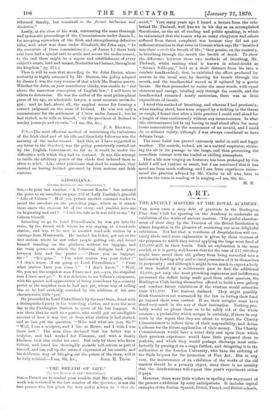GIBSONIANA.
[TO THE EDITOR OF THE ''SPECTATOR.1
Sin,—In your last number, " A Constant Reader " has restored the point to an anecdote on page 233 of Lady Eastlake's graceful "Life of Gibson." Will you permit another constant reader to mend the anecdote on the preceding page, which as it stands there omits the choicest bit of the story, and jumbles into one its beginning and end? "I tell the tale as it was told to me" by Gibson himself.
Intending to go to Lord Fitzwilliain's, he was put into the train, by the friend with whom he was staying, at a road-side station, and was to be met at another road-side station by a carriage from Wentworth. He mislaid his ticket, got out at the first station where lie saw other people getting out, and found himself standing ou the platform without his luggage, and the train gone,—on which the following dialogue took place between him and the porter —" have you no luggage, Sir?" "It's gone." "For what station was your ticket?" " I don't know. I am going to Lord Fitzwilliam's." " From what station have you come ?" "I don't know." " Well, Sir, you are the stupidest man I have met yet,—yes, the stupidest man I have met yet." It was delicious to see Gibson's enjoyment, with his quaint self-appreciation of being considered by a country porter as the stupidest man he had met yet, whose way of telling him so lie had evidently enriched by the addition of his own characteristic little ' yes.'
He proceeded to Lord Fitzwilliam's by the next train, dined with a distinguished party in his travelling clothes, and went the next day to the Paddington Station in quest of his lost luggage. It was there that he said to a porter, who could get no intelligible account of how it was lost or from what station it had started, and at last put the question, "Who and what are you, Sir ?" " Well, I am a sculptor, and live at Rome, and I wish I was there now." The man then declared that his father was a sculptor, and had worked for Flaxman, and with a hearty kindness took him under his care. But only by those who knew Gibson, and loved his thoroughly amiable self-esteem as part of himself, and can call up the amused expression of his mouth, and his deliberate way of bringing out the points of the story, will it
be fully relished.—I am, Sir, So., 3011S H. THOM.


































 Previous page
Previous page